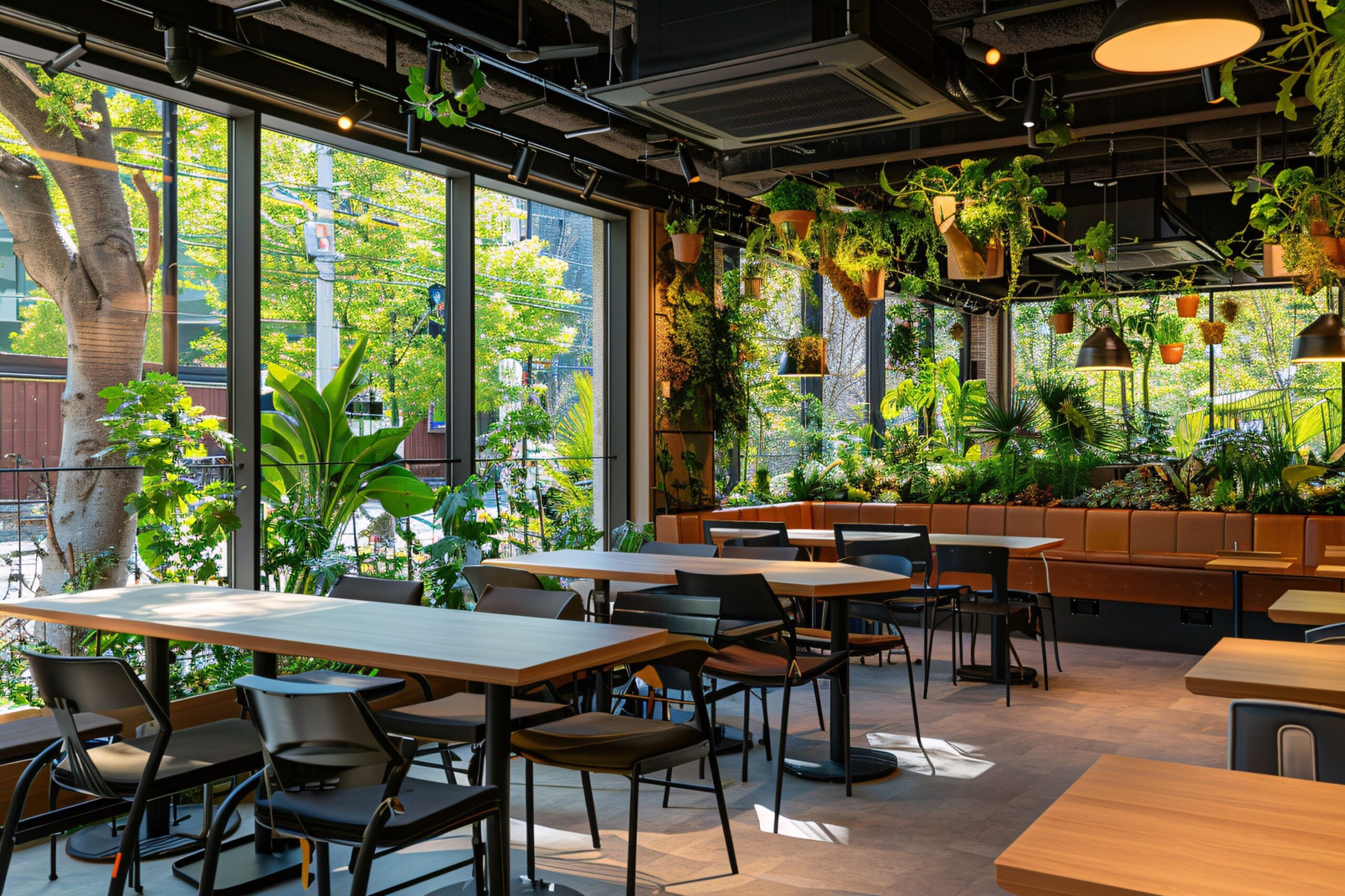In an era where environmental consciousness is at an all-time high, restaurant sustainability practices are no longer just a trend, they are a necessity. According to a 2024 report by the Sustainable Restaurant Association (UK), 82% of UK consumers prefer dining at restaurants that prioritize sustainability, and 58% are willing to pay more for eco-friendly options. Additionally, the Food and Agriculture Organization (FAO) highlights that the food industry accounts for 26% of global greenhouse gas emissions, making it crucial for restaurants to adopt sustainable restaurant practices. Whether you’re a small café or a large chain, learning how to make restaurants more sustainable can not only reduce your environmental footprint but also attract eco-conscious customers, cut operational costs, and future-proof your business. In this blog, we’ll explore actionable steps to help your restaurant go green and thrive in today’s competitive UK market.
How Sustainability is Transforming UK Restaurants
- 82% of UK consumers now prefer dining at restaurants that prioritize sustainability (Sustainable Restaurant Association, 2024), driving a shift toward eco-friendly practices across the industry.
- 58% of diners are willing to pay more for meals at sustainable restaurants (Nielsen, 2024), proving that sustainability can be a profitable differentiator.
- The food industry contributes to 26% of global greenhouse gas emissions (FAO, 2024), and UK restaurants are stepping up by sourcing locally, reducing waste, and using energy-efficient equipment to cut their carbon footprint.
- UK restaurants that compost reduce landfill waste by up to 60% (WRAP, 2024), helping the environment while complying with strict UK waste regulations.
- Energy-efficient equipment can slash energy costs by up to 30% (Energy Saving Trust UK, 2024), making sustainability a smart financial decision.
- Restaurants that track food waste reduce their waste by 50% on average (WRAP, 2024), improving efficiency and saving money.
- With the UK government enforcing bans on single-use plastics and mandating food waste reporting, sustainability has become a legal necessity for restaurants.
- 83% of UK diners are more likely to support restaurants that actively promote sustainability (Nielsen, 2024), helping build customer loyalty and a strong brand reputation.
- Sourcing ingredients locally can reduce a restaurant’s carbon footprint by up to 25% (Sustainable Restaurant Association, 2024) while supporting local farmers and boosting the economy.
- 89% of UK restaurant owners plan to invest in sustainability initiatives in 2024 (National Restaurant Association, 2024), showing that sustainability is now a key competitive advantage.
- By embracing sustainable practices, UK restaurants are future-proofing their businesses, attracting eco-conscious customers, and contributing to the UK’s goal of achieving net-zero carbon emissions by 2050.
Steps to Make Your Restaurant More Sustainable
Step 1: Source Locally and Seasonally
Sourcing ingredients locally and seasonally is a powerful way to make your restaurant more sustainable. Here’s why and how to do it:
Why Source Locally?
1. Reduce Carbon Footprint:
Local sourcing cuts down on transportation emissions, reducing your restaurant’s carbon footprint by up to 25% (Sustainable Restaurant Association, 2024).
2. Support Local Economies:
Buying from local farmers boosts the community and creates jobs.
3. Ensure Freshness:
Local ingredients are fresher, enhancing the quality and taste of your dishes.
Why Source Seasonally?
1. Environmental Benefits:
Seasonal produce requires less energy to grow, reducing environmental impact.
2. Cost Savings:
Seasonal ingredients are often cheaper and more abundant.
3. Menu Innovation:
Rotating seasonal items keeps your menu exciting and encourages creativity.
How to Implement It
1. Partner with local farmers and visit farmers’ markets.
2. Design a seasonal menu that highlights fresh, local ingredients.
3. Promote your efforts to attract eco-conscious customers.
4. Stay flexible and adapt to seasonal availability.
Step 2: Reduce Food Waste

Reducing food waste is a key step in making your UK-based restaurant more sustainable. Start by implementing portion control and menu engineering to minimize leftovers and make the most of your ingredients. Use innovative tools like Winnow (a UK-based food waste tracking system) to monitor waste, identify trends, and take action to reduce it. Additionally, partner with local charities like FareShare to donate surplus food or compost organic waste through services like BioCollective or ReFood.
UK restaurants that track food waste reduce their waste by 50% on average (WRAP, 2024). By adopting these practices, you can cut costs, support your community, and significantly lower your environmental impact while aligning with the UK’s sustainability goals.
Step 3: Switch to Energy-Efficient Equipment
Switching to energy-efficient equipment is a smart and sustainable move for UK-based restaurants. Here’s how to do it:
- Upgrade to ENERGY STAR-Certified Equipment: Replace old appliances with energy-efficient models that meet UK standards.
- Install LED Lighting: Use energy-saving LED bulbs and motion sensors to reduce electricity usage in low-traffic areas.
- Use Smart Thermostats: Optimize heating and cooling systems with smart thermostats to save energy and reduce costs.
Energy-efficient equipment can cut energy costs by up to 30% (Energy Saving Trust, UK, 2024).
By making these changes, your restaurant can lower energy bills, reduce its carbon footprint, and align with the UK’s sustainability goals.
Step 4: Eco-friendly Packaging

Reducing single-use plastics is vital for sustainability. Traditional packaging contributes significantly to environmental pollution. Switch to alternatives such as biodegradable, recyclable, or compostable options. These materials break down more easily and have less environmental impact.
Look for suppliers who specialise in sustainable packaging solutions. By choosing eco-friendly packaging, you align your restaurant with green practices. This can attract eco-minded customers and boost your brand’s reputation.
Step 5: Eliminate Single-Use Plastics

Eliminating single-use plastics is essential for UK restaurants to meet sustainability goals and consumer expectations. Here’s how:
- Switch to Sustainable Alternatives: Replace plastic straws, cutlery, and containers with biodegradable or reusable options like paper, bamboo, or plant-based materials.
- Encourage Reusables: Offer discounts to customers who bring their own cups or containers.
- Educate and Promote: Train staff and use signage to highlight your efforts.
70% of UK consumers prefer restaurants that avoid single-use plastics (Nielsen, 2024).
Example: Pret A Manger offers discounts for reusable cups and has phased out single-use plastic bottles.
By taking these steps, your restaurant can reduce waste, comply with UK plastic bans, and attract eco-conscious customers.
Step 6: Water Conservation

Reducing water waste is a key sustainability practice for UK-based restaurants. Here’s how to do it:
- Install Water-Saving Fixtures: Use low-flow faucets and pre-rinse spray valves to cut water usage.
- Train Staff: Educate employees on efficient water use during cleaning and food prep.
- Reuse Water: Collect and reuse water for landscaping or cleaning where possible.
Water-efficient practices can save UK restaurants up to 15,000 gallons of water annually (Environment Agency UK, 2024).
By adopting these measures, your restaurant can conserve water, lower utility bills, and support the UK’s sustainability goals.
Step 7: Offer Plant-Based and Sustainable Menu Options
- Introduce Plant-Based Dishes: Add more plant-based options to your menu, as they have a significantly lower environmental impact compared to meat-based dishes. For example, dishes featuring lentils, chickpeas, or tofu can be both nutritious and eco-friendly.
- Source Sustainable Seafood: Partner with suppliers certified by organizations like the Marine Stewardship Council (MSC) to ensure your seafood is sourced responsibly.
Plant-based menu items can reduce a restaurant’s carbon footprint by up to 50% (University of Oxford, 2024).
Step 8: Sustainable Transportation
Eco-friendly delivery and transportation are essential for a sustainable restaurant. Consider using electric or hybrid delivery vehicles to reduce emissions. Partner with sustainable delivery services. They will ensure your food reaches customers with minimal environmental impact.
Pentagon Food Group commits to safe and sustainable Food Transport. They are an excellent partner for your delivery needs. By using sustainable transportation, you also reduce your restaurant’s carbon footprint. And you help broader environmental goals.
Step 9: Use Eco-Friendly Cleaning Products

- Switch to Green Products: Replace traditional cleaning chemicals with non-toxic, biodegradable alternatives to reduce water pollution and create a safer environment for staff and customers.
- Avoid Single-Use Wipes: Opt for reusable microfiber cloths instead of disposable cleaning wipes to cut down on waste.
- Stat: Eco-friendly cleaning products reduce water pollution by up to 30% (Green Seal, 2024).
Step 10: Create a Green Culture
Promoting a culture of sustainability within your restaurant starts with training your staff. Educate them on sustainability practices and encourage participation in green initiatives. When your team is committed to sustainability. They can help put in and keep eco-friendly practices better.
Encourage customer participation by promoting your green initiatives and inviting feedback. This improves customer engagement. It also shows your restaurant’s commitment to sustainability.
Step 11: Implement Recycling and Composting Programs

- Set Up Recycling Stations: Place clearly labeled recycling bins in staff areas and customer spaces to encourage proper waste disposal.
- Compost Organic Waste: Partner with local composting facilities like BioCollective or ReFood to turn food scraps into nutrient-rich compost instead of sending them to landfills.
- Train Staff: Educate employees on how to separate recyclables, compostable, and general waste correctly.
Restaurants that compost reduce landfill waste by up to 60% (WRAP UK, 2024).
Step 12: Engage Customers in Your Sustainability Journey
- Promote Your Efforts: Share your sustainability initiatives on social media, your website, and in-store signage to build trust and loyalty.
- Offer Incentives: Encourage customers to participate by offering discounts or loyalty points for bringing reusable containers, cups, or bags.
83% of UK diners are more likely to support restaurants that actively promote sustainability (Nielsen, 2024).
Read More: Top 10 Essential Types of Restaurant Technology
Conclusion
Making your restaurant more sustainable involves several key steps. Each step makes it greener and more efficient. The long-term benefits of adopting these sustainable practices are substantial. You will cut your environmental impact. These sustainable restaurant practices not only help protect the planet but also future-proof your business in an increasingly competitive market. Customers in the UK are actively seeking out restaurants that prioritize sustainability, with 83% of diners more likely to support eco-friendly establishments (Nielsen, 2024).
Start small, stay consistent, and watch as your commitment to sustainability transforms your restaurant into a leader in the industry. Together, we can build a more sustainable food system, one plate at a time.






